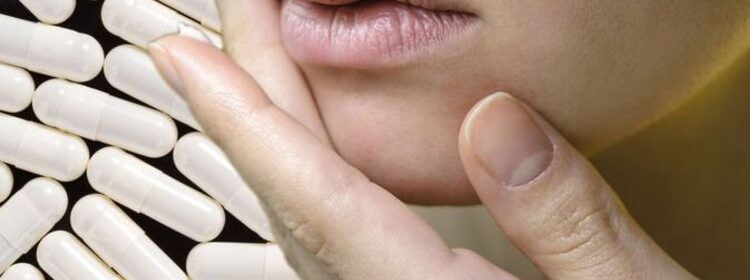Statins side effects: The alarming reaction that can affect the lips and tongue at night

Statins: How the drug prevents heart attacks and strokes
We use your sign-up to provide content in ways you’ve consented to and to improve our understanding of you. This may include adverts from us and 3rd parties based on our understanding. You can unsubscribe at any time. More info
Statins carry out the role of lowering baseline levels of cholesterol in the blood. The drug also draws out plaque, which helps avert the risk of adverse cardiac events like heart attack and stroke. But the debate over whether the benefits of the drug outweigh the risks remains in full flow, however. Complaints of body pain, for example, are common following statin use. One other side effect, which affects the lips and tongue, maybe a lesser-known reaction to the drug.
According to the NHS: “Rosuvastatin belongs to a group of medications called statins. It’s used to lower cholesterol if you have been diagnosed with high cholesterol.
“It’s also taken to prevent heart and blood vessel disease, heart attacks and strokes.”
Given the drug’s ubiquity, it is widely accepted that the medication has a good safety profile.
Common side effects typically include feeling sick, headache, stomach pain, feeling weak or dizzy and constipation.
READ MORE: High cholesterol: The ‘early symptom’ of plaque build-up in your calf, buttocks or thighs

But slightly more severe side effects have been reported in connection to the drug too, including angioedema.
Angioedema is the result of an allergic reaction that occurs when the body mistakes a harmless substance for something dangerous.
The body releases chemicals into the body to take down the foreign substances, which causes the skin to become swollen.
Swelling usually occurs beneath the surface skin in the hands, feet, the area around the eyes, lips, tongue and genitals.
What’s more, the swelling can develop suddenly or come on gradually over a few hours, explains the NHS.
“It may last for a few days,” adds the health body.
In a 2018 case study presented in the medical journal Cureus, researchers listed the reaction as a rare side effect of rosuvastatin.
The authors explained: “Angioedema is the swelling of mucosa and subcostal tissues and presents as the swelling of the face, lips and tongue.

“It can be severe and life-threatening when it involves the respiratory tracts.”
The drugs generally associated with Angiodemia usually include non-steroidal anti-inflammatory drinks and angiotensin-converting enzyme inhibitors.
The reaction is rarely reported in connection to statins.
The paper authors detailed the case of a 45-year-old female patient with a past medical history of hypothyroidism and hyperlipidemia, who presented with recurrent night episodes of facial, lips and tongue swelling.

Two months prior to her symptoms, the patient started taking 20 mg of rosuvastatin for hyperlipidemia.
“Since that time, she had episodes of facial, lip and tongue swelling that woke her up almost every night,” explained the authors.
The researchers added: “The temporal relation between rosuvastatin and the development of angioedema and prompt resolution of symptoms after drug discontinuation suggest that rosuvastatin was the most probable culprit for the development of angioedema in our patient.”
While the drug describe the side effect in connection to rosuvastatin, they cautioned that other chemically-related statins could also lead to similar complications.
Source: Read Full Article